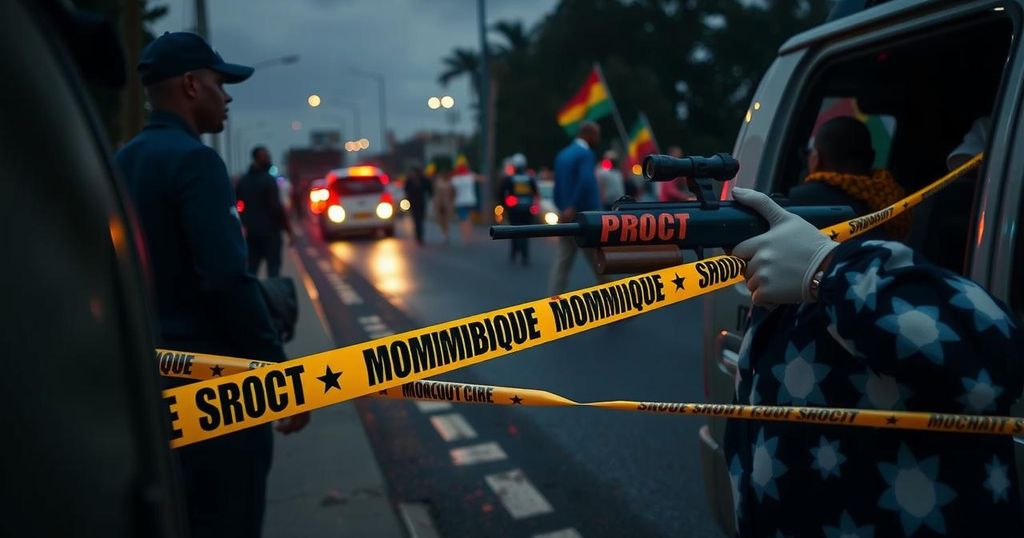Assassination of Opposition Officials in Mozambique Escalates Political Tensions

Two officials from the Mozambique opposition party Podemos were assassinated by gunmen in Maputo just before protests against disputed election results. This violent incident raises significant concerns regarding political stability and the conduct of upcoming elections, with mounting allegations of fraud and repression against the ruling Frelimo party.
In Mozambique, gunmen have assassinated two prominent officials from the opposition party Podemos, namely party lawyer Elvino Dias and representative Paulo Guambe. This violent incident occurred late on Friday night in the capital city, Maputo, just prior to anticipated protests regarding a contentious election result. The assailants pursued the vehicle carrying Dias and Guambe, opening fire and fatally wounding both men. Videos circulating on social media depicted a BMW SUV riddled with bullet holes and the deceased occupants slumped over in their seats. The assassination of the two officials significantly escalates the already high tensions within Mozambique, as the nation grapples with the aftermath of the October 9 elections, which have been marred by allegations of electoral fraud and repression of dissent by the long-dominant Front for the Liberation of Mozambique (Frelimo) party. Podemos has openly rejected the provisional election results, which favor Frelimo, and has called for a nationwide strike in response. Venancio Mondlane, who ran for presidency as an independent, received support from Podemos, further intensifying the political stakes. This tragic incident is perceived as indicative of the grave lack of justice prevailing in the nation. Observers and rights groups have reported extensive electoral malpractice, including vote-buying and intimidation, especially in regions where Frelimo maintains strong support. The expected official announcement of election results is set for October 24, amidst growing concerns that the opposition protests planned for Monday may turn violent. Mozambique’s past experiences involving security forces opening fire on demonstrators add urgency to these fears. Adriano Nuvunga, director of the Mozambique Center for Democracy and Human Rights (CDD), characterized the incident as a cold-blooded murder, asserting that approximately 10 to 15 bullets were fired, leading to the immediate deaths of the victims.
The political landscape of Mozambique has been fraught with instability and violence since the introduction of multiparty democracy in 1994 following a prolonged civil war. The ruling party, Frelimo, has faced increasing allegations of electoral fraud and suppression of opposition voices, particularly during recent election cycles. The current context is compounded by widespread socioeconomic challenges, including insecurity and food shortages induced by drought. The lead-up to the elections on October 9, 2023, was characterized by a hostile environment for dissent, with numerous reports of intimidation against opposition parties. The upcoming announcement of the election results has raised considerable anxiety about potential unrest among frustrated voters and opposition supporters.
In summary, the assassination of Elvino Dias and Paulo Guambe has underscored the severe political tensions in Mozambique, particularly in the aftermath of a disputed electoral process. This incident not only highlights the danger faced by opposition figures but also reflects broader issues of political violence and governance in the country. As Mozambique prepares for potential protests against the perceived injustices of the electoral outcome, the international community remains watchful of the developments that may arise from this tragic event, further necessitating dialogue on the urgent need for political reform and accountability within Mozambican governance.
Original Source: www.aljazeera.com







